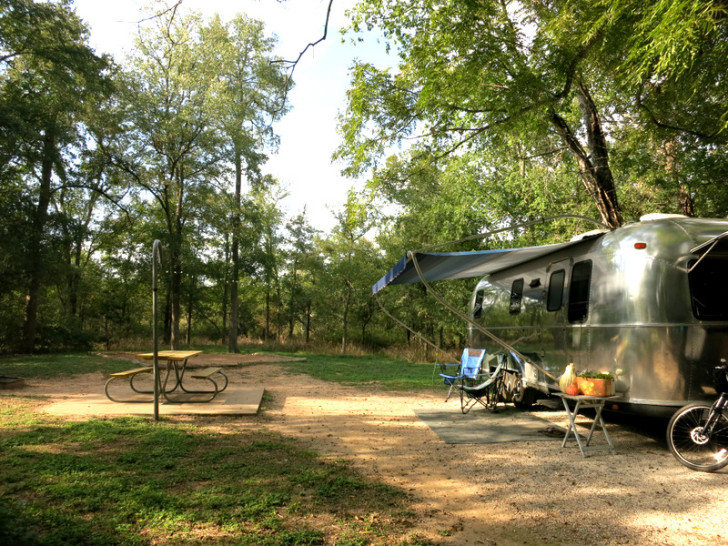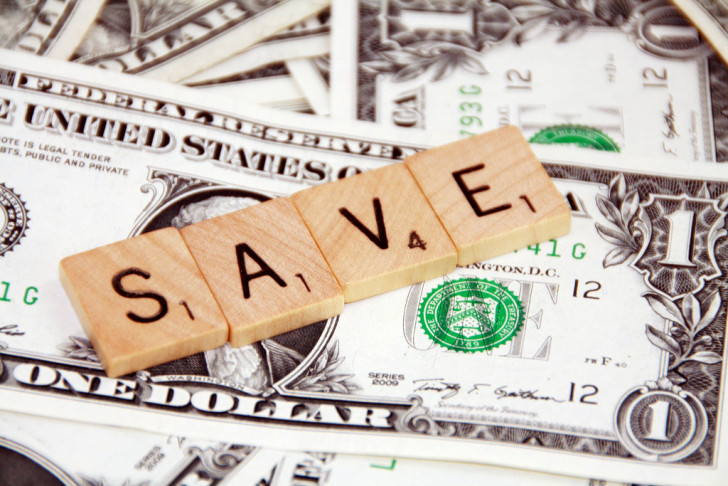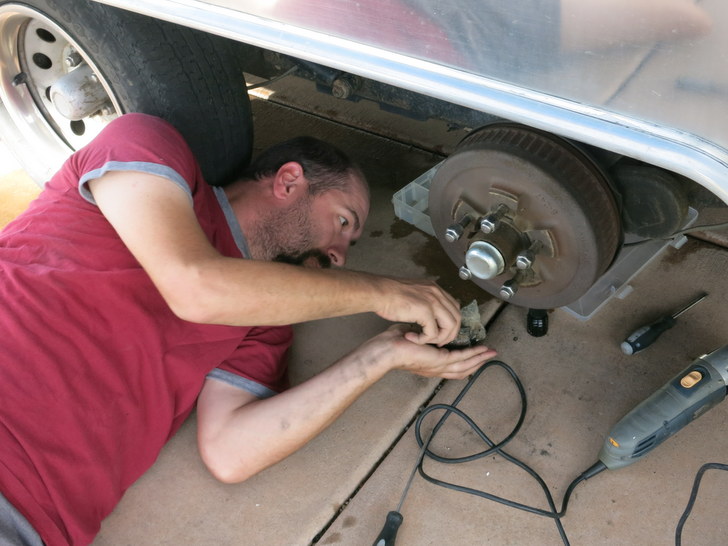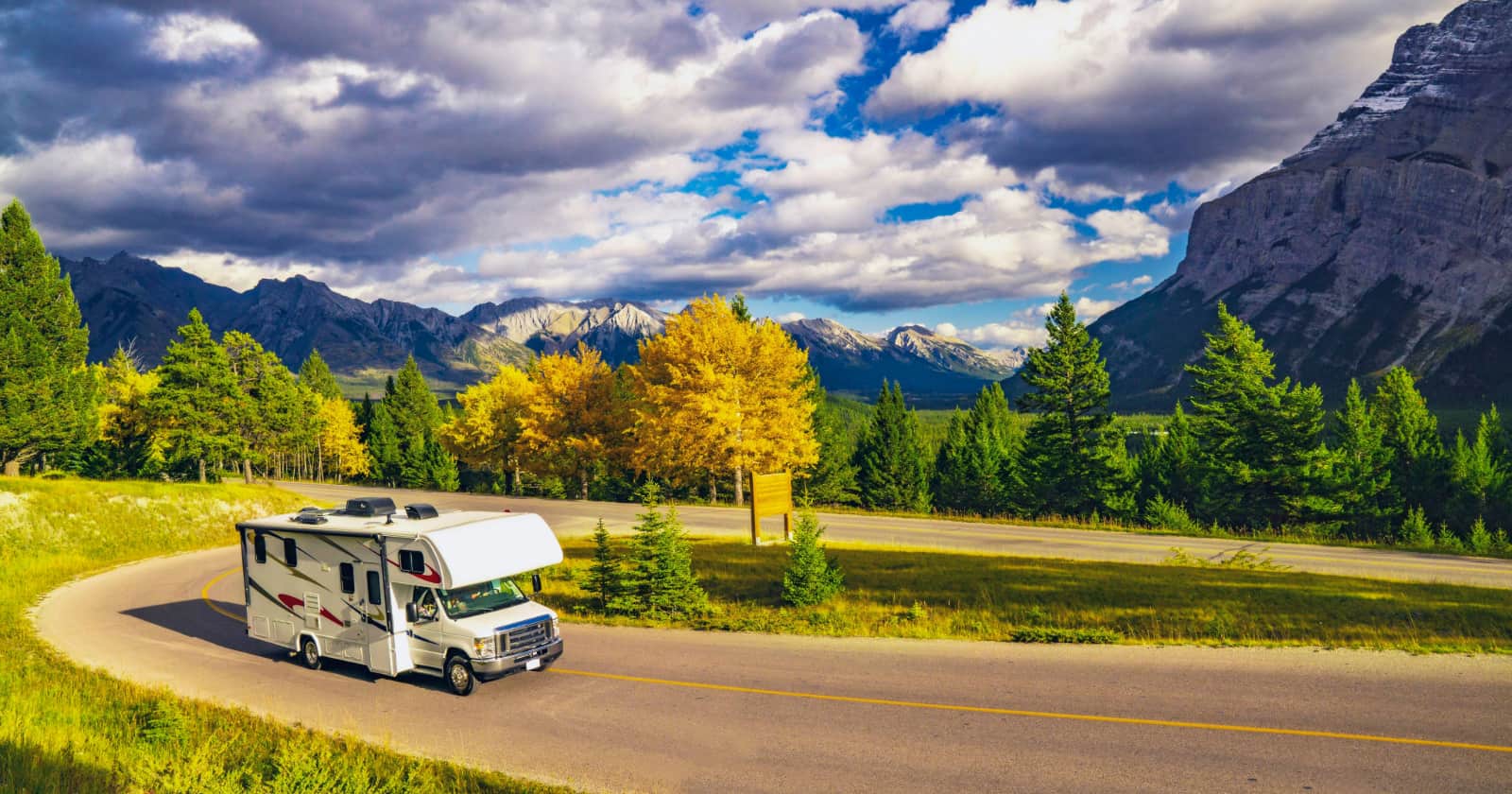There’s no denying that taking an RV trip can be far more economical than other methods of travel. If you add up the cost of airfare, rental cars, eating out for every meal, parking, attractions, souvenirs and more…the cost of campground fees and fuel for the RV pales in comparison.
But that doesn’t mean we can’t still strive to save some dough when RVing. Check out these 20 money saving tips for frugal RVing—because everyone loves a deal.
1. Utilize public campgrounds

Public campgrounds are always less expensive than privately run RV parks. If you’re okay with a more basic, back to nature camping experience, consider a public camping area like a state park, national park, national forest, city and country parks, or Army Corps of Engineers campgrounds.
For a full listing of public campgrounds around the country visit USCAmpgrounds.info. You can also read more about them on RV Park Reviews.
2. Boondocking
Camping out in the wild with no campground fees is about as good as it gets when it comes to saving money while RVing. I mean…what’s cheaper than free?
If you love spending time in nature and don’t mind producing your own energy and conserving water and tank space, then boondocking can save you thousands per year.
If the minimalist style of RVing is not your thing, you can still save money by urban boondocking in parking lots on travel days when you need a place to spend a single night. Places such as Walmart, Cabela’s, and rest areas often allow overnight parking in convenient locations.
3. Stay longer
Many campgrounds offer discounts for longer stays. If you plan to be in one area for longer than a few days, consider staying the week and getting a better rate. Or if you really want to get to know a place—why not spend the month and save even more?
4. Get a discount camping membership
Discount camping memberships can save a ton of money on camping fees. Most only cost a minimal annual fee, and in exchange, you get discounts of up to 50% off many campgrounds around the U.S.
Our favorite is Passport America. For a $44 annual fee (or $79 for two years) you receive 50% off the nightly rate at a large network of campgrounds. Yes, there are restrictions on stay limits and blackout dates for certain times of the year, but with such a low annual fee, the membership easily pays for itself.

5. Join a camping club
For even deeper savings, join a camping club and gain access to a network of campgrounds at cheap prices.
- Thousand Trails: Offers zone passes that allow you to camp for free in a network of campgrounds around the U.S. The price varies depending on the number of zones you purchase and how long you sign up for.
- Escapees: An all-encompassing RV club that offers exclusive access to 19 Escapees parks, plus a 15-50% discount at nearly 1,000 campgrounds around the U.S. They also provide their members with a parking directory filled with free overnight parking options. The annual fee to join is only $40.
6. Avoid peak camping season
Many campgrounds raise their rates during the most popular times of the year. That means savvy travelers who visit in the off-season can save a lot.
Since you probably don’t want to visit Montana in the winter or Florida in the summer, check out the rates during the shoulder season (between peak and off-season). As a bonus visiting during the less busy times of year will help you avoid large crowds.
7. Consider workamping
If volunteering your time in exchange for a free campsite sounds like something you would enjoy, then camp hosting, or workamping, could save you some serious dough. There are a wide variety of camp hosting jobs ranging from running the office at a private RV park to raking sites at a national park.
There are several resources for finding camp hosting jobs including Workamper News and Workamping Jobs.
8. Eat at home
It’s no secret that eating freshly prepared meals at home is far cheaper than eating out. Going to a restaurant every night is a sure way to bust the budget. Yes, your RV kitchen is small, but that doesn’t mean you can’t make simple, tasty meals at home.

9. Be an early bird
In this case, the early bird doesn’t catch the worm—it catches a good deal at a restaurant! Save money on early bird specials and happy hour deals. Many restaurants offer a limited menu at deep discounts if you are willing to eat a little earlier than normal.
10. Plan ahead
There are many ways that planning ahead can save you money on food when RVing.
- Shop ahead and avoid high prices at the stores in popular tourist areas.
- Avoid food waste by planning menus and only buying what you need.
- Buy large quantities at places like Costco and Sam’s Club then divide it into smaller portions to bring in the RV.
- Bring a Crockpot and make big pots of things like pulled pork or chili that can be turned into multiple meals.
11. Pack a lunch
If you plan to spend all day away from the RV, pack a lunch and some snacks in a small cooler. You will spend less money than if you ate out, and you will get to enjoy the great outdoors while munching down on that PB&J.

12. Ask the experts
When you arrive in a new place seek out the chamber of commerce or visitor center. The staff will happily provide you with not only more free maps and pamphlets than you can carry but will also give you the low down on deals and discounts on popular attractions.
13. Use discount websites
Websites like Groupon and Living Social can help you save on all sorts of fun activities. If you’re looking for deals on kayak or paddle board rentals, museums, fun parks, movies and shows, or city tours chances are you will find it on one of these sites.
Remember that these sites change their deals often, so be sure to jump on it if you see something that interests you. Usually, you’ll have a few weeks or even months to use the deal after purchase.
14. National Park Pass
If you plan to visit more than two national parks in any given year, the Annual National Park Pass is well worth the $80 fee. This pass provides free entry for carloads of up to 4 adults into any national recreation area.
With weekly passes for popular parks such as Yellowstone and Zion hovering around $30, the pass is well worth it. They also offer discounted passes for seniors, 4th-grade students, visitors with disabilities, volunteers, and military.
15. Borrow some fun
Rainy day got you down? You could spend $15 each to visit the nearby tin can museum…or you could walk over to the lending library at your campground and find a new movie or book to keep you occupied.
16. Free can be fun too
There’s no need to spend money to have fun. Take a hike, go for a bike ride, walk around town, have a picnic in the park, sit around the campfire…the list goes on and on. Some of the most rewarding camping activities are those that are free.
17. Maintain, maintain, maintain
The better you maintain your RV the fewer problems you are likely to have, which in turn means more money in your pocket. If you travel in a motorhome, get regular oil changes and tune-ups.
If you have a trailer or fifth wheel, keep the hitch in good shape. For all RVs, check the tires, the roof, the window seals, and the appliances on a regular basis or before you take any trip.

18. Do It Yourself!
You don’t need to be a certified mechanic to fix and maintain basic things around your RV. Study the manual or look online to teach yourself the simple ins and outs of your home on wheels. There are lots of things you can do yourself to save money including changing the oil, rotating the tires, and diagnosing simple electrical and mechanical problems.
19. Don’t let it snowball
Don’t let a simple problem turn into an expensive nightmare. If you see a small leak in your RV, don’t wait until the entire wall caves in before you get it fixed. Attending to small problems before they turn into big problems can save you a lot of money.
20. Replace your tires
I know, I know, RV tires are expensive. But the fact is that worn tires can have a significant impact on your gas mileage. Investing in new tires for the RV can not only save you money on gas, it can also help prevent a blow out which can cause thousands in damage, not to mention putting you and your family in a dangerous situation.
How do you save money while you’re on the road? We’d love to hear your tips below.




Yes my friend and I both got a parks pass for the dissabled the fee is $10.00 for the actual paperwork and they are good for life. We used them at the Grand Canyon. for our 2 car loads with the grand kids. It was a great savings for us and made the trip for our whole family affordable.
We don’t boondock, but we spend at least a month every year camping in free National & State Forest campgrounds. They have a table, fire ring, level place to park & outhouse & most are next to a lake or river. Usually 3 or 4 sites & we are often by ourselves & if there are other campers you usually can’t see them. For the rest of our camping we average less than $10/ night.
The National Park Senior Pass will get your whole carload into National parks for free, as well as a significant discount at National Forest campgrounds. A lifetime pass is $80 and annual pass is $20.
Another good investment is a tire pressure monitoring system. We had a tire go flat on our 5th wheel while driving on the interstate. I was completely unaware until passing motorists got my attention. It was on the passenger side so the tire and wheel were destroyed, along with bodywork damage before anyone noticed it. I thought for sure I would be aware of a low tire on the camper but I had no clue. The camper pulled the same and the chunks of rubber were barely visible in the mirrors. A tire repair or replacement would have saved us a good bit of money.
Corps of Engineers also accepts the National Park Service Senior Pass (Seniors) and Access Pass (Disabled) for half-price off their already reasonable rates. And with campgrounds in 44 of the 50 states, it’s easy to take full advantage of the discount.
Great site
If you are HANDICAPPED you can get a FREE National Parks Pass–I forget the exact name–but ask at the Info Center or I am sure there is an on-line way to get this–you fill out a form and it gets you AND another person–not sure about a whole family—into Nat Parks for LIFE.
I never knew about this until I went to a Nat Park and the nice Ranger offered this to me. Half the time we never even SEE a Ranger to give this Pass to when we get to a Park—tho I always have it handy if we do see some one interested in it!